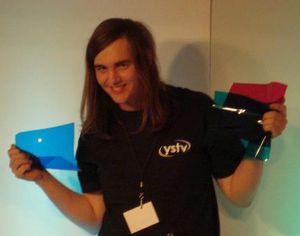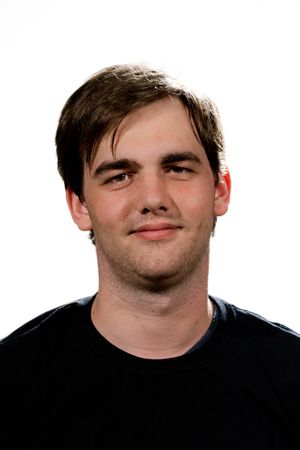Michael Chislett: Difference between revisions
Jump to navigation
Jump to search
Mikechislett (talk | contribs) No edit summary |
No edit summary |
||
| (5 intermediate revisions by 3 users not shown) | |||
| Line 1: | Line 1: | ||
[[File: | [[File:Mikw wiki.JPG|right|thumb|300px|Mike Chislett with long hair... (now short)]] | ||
==Simple Facts about Mike== | ==Simple Facts about Mike== | ||
*Mike joined in 2009 at Freshers Fair. | *Mike joined in 2009 at Freshers' Fair. | ||
*Mike has a slight hate of | *Mike has a slight hate of Mac OS X, due to it being left hand drive - prefers window controls on the right. | ||
*Likes lighting rigs. | *Likes lighting rigs. Far too much. | ||
*Invented [[ | *Invented [[Windowvision]] 2010/2011. | ||
*Won NaSTA | *Won NaSTA Best Technical Achievement for chainable video matrixes. | ||
*Won YUMA for first piece of | *Won [[YUMAs|YUMA]] for first piece of [[YSTV 3D|3D student television]]. | ||
*Resident of [[84 Thief Lane]]. | |||
==things== | ==things== | ||
* Fast food. A show about food that is fast. | * Fast food. A show about food that is fast. Takeaways, quizzes, and some bloke who has a strange habit of blending/liquidising cheap meals. Fast food's first episode was a complete disaster, and the only interesting thing was apparently Chris Young's choice of clothing. For some unknown reason, people insisted on watching it. As a result, Mike hid the episode from the website's view, in the hope that it would sink down the search results! Series 2 will not happen, as Mike spent too long fixing Comms and the Main Mux... | ||
* Create YSTV "big logo" idents. Go round campus projecting logo all over the place. | * Create YSTV "big logo" idents. Go round campus projecting logo all over the place. | ||
** It works | ** It works. | ||
* Infinite loop idents / stings | * Infinite loop idents / stings | ||
**done (LOGOcutout, and TVloops) | |||
* GD set. | * GD set. | ||
** A glowing pulsating monstrous set, requiring over 400 foot of jigsawing. The | ** A glowing pulsating monstrous set, requiring over 400 foot of jigsawing. The GD set is wheeled out almost every year now. The sets feature a TRON-esque series of channels cut from the 8'x4' boards, filled with grease-proof paper, then back-lit with a suitably "electric blue" or other colour. The grease-proof paper's imperfections make for a somewhat "bio-mechanical" feel, and when a chase is applied to the back lighting many people note that it makes the room feel alive. | ||
* Chainable video matrixes | * Chainable video matrixes | ||
** Over 2010 - 2011, Mike set about building the "better than standard" video | ** Over 2010 - 2011, Mike set about building the "better than standard" video matrix system. Built as two 8-in 8-out matrixes, they can also join together to make a larger 16x8 system. They conform to Mike's standard "YVP". | ||
* YVP ( | * YVP (YSTV Vision Path) | ||
** Because | ** Because having everything talk to everything else is so cool. | ||
** YVP is pretty much butchered | ** YVP is pretty much butchered XML, with the driving principle being that machines can be used to create a mass routing table: this can then be read off to various other bits of kit, which can then display and react on the fly. For example, someone connects up three cameras, and isn't familiar with how the vision path works. All they do is open the YVP program, tell it they want ''those'' three cameras from ''those'' plugs in the studio, to go on ''those'' vision mixer inputs. The system then arranges itself, complete with matching tally lights. The Vision Mixer then reports back which inputs are live, and the YVP machine activates the tally lights accordingly. | ||
== Posts == | == Posts == | ||
[[File:Mike Chislett - Deputy Technical Director.jpg|thumb|right|Summer 2012]] | |||
*2009/2010 [[Scheduling Manager]] | *2009/2010 [[Scheduling Manager]] | ||
*2010/2011 [[Technical Director]] | *2010/2011 [[Technical Director]] | ||
*2011/2012 Still the [[Technical Director]] | *2011/2012 Still the [[Technical Director]] | ||
*2012/- | *2012/ - 11/2012 [[Deputy Technical Director]], because I just can't leave! | ||
[[Category:People|Chislett,Michael]] | [[Category:People|Chislett, Michael]] | ||
[[Category:84 Thief Lane]] | |||
Latest revision as of 15:06, 1 May 2013
Simple Facts about Mike
- Mike joined in 2009 at Freshers' Fair.
- Mike has a slight hate of Mac OS X, due to it being left hand drive - prefers window controls on the right.
- Likes lighting rigs. Far too much.
- Invented Windowvision 2010/2011.
- Won NaSTA Best Technical Achievement for chainable video matrixes.
- Won YUMA for first piece of 3D student television.
- Resident of 84 Thief Lane.
things
- Fast food. A show about food that is fast. Takeaways, quizzes, and some bloke who has a strange habit of blending/liquidising cheap meals. Fast food's first episode was a complete disaster, and the only interesting thing was apparently Chris Young's choice of clothing. For some unknown reason, people insisted on watching it. As a result, Mike hid the episode from the website's view, in the hope that it would sink down the search results! Series 2 will not happen, as Mike spent too long fixing Comms and the Main Mux...
- Create YSTV "big logo" idents. Go round campus projecting logo all over the place.
- It works.
- Infinite loop idents / stings
- done (LOGOcutout, and TVloops)
- GD set.
- A glowing pulsating monstrous set, requiring over 400 foot of jigsawing. The GD set is wheeled out almost every year now. The sets feature a TRON-esque series of channels cut from the 8'x4' boards, filled with grease-proof paper, then back-lit with a suitably "electric blue" or other colour. The grease-proof paper's imperfections make for a somewhat "bio-mechanical" feel, and when a chase is applied to the back lighting many people note that it makes the room feel alive.
- Chainable video matrixes
- Over 2010 - 2011, Mike set about building the "better than standard" video matrix system. Built as two 8-in 8-out matrixes, they can also join together to make a larger 16x8 system. They conform to Mike's standard "YVP".
- YVP (YSTV Vision Path)
- Because having everything talk to everything else is so cool.
- YVP is pretty much butchered XML, with the driving principle being that machines can be used to create a mass routing table: this can then be read off to various other bits of kit, which can then display and react on the fly. For example, someone connects up three cameras, and isn't familiar with how the vision path works. All they do is open the YVP program, tell it they want those three cameras from those plugs in the studio, to go on those vision mixer inputs. The system then arranges itself, complete with matching tally lights. The Vision Mixer then reports back which inputs are live, and the YVP machine activates the tally lights accordingly.
Posts
- 2009/2010 Scheduling Manager
- 2010/2011 Technical Director
- 2011/2012 Still the Technical Director
- 2012/ - 11/2012 Deputy Technical Director, because I just can't leave!

